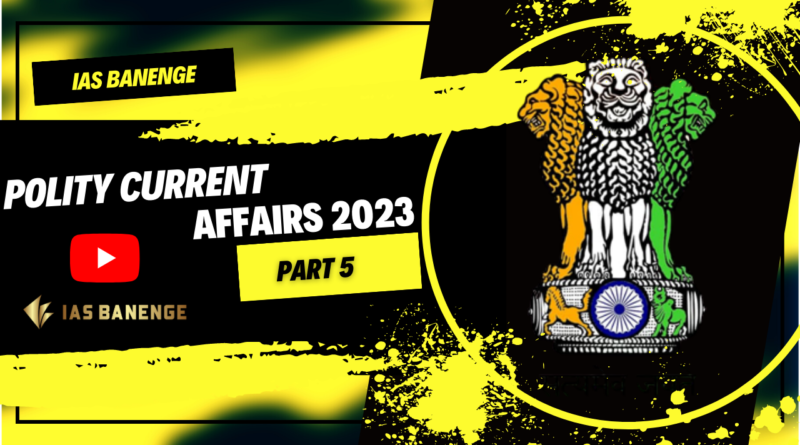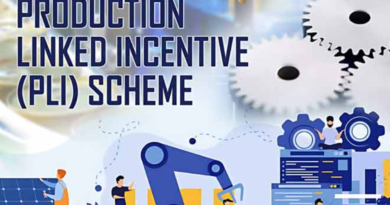Polity and Governance Current Affairs for UPSC 2023 I PART – 5
CURRENT AFFAIRS FORM TOPIC – ELECTIONS
1. ANTI-DEFECTION LAW
Legalities of Elected MLAs Switching Parties in the Midst of Political Crisis in Maharashtra.
Defection refers to the practice of a member of one political party crossing over to another party. The Anti-Defection Law, which was included under the 10th schedule via the 52nd amendment act in 1985, provides for the disqualification of MLAs who voluntarily give up their party membership after being elected on a political party’s ticket. Any question regarding disqualification arising out of defection is to be decided by the presiding officer of the House, who is empowered to make rules to give effect to the provisions of the Tenth Schedule. The grounds of disqualification include voting or abstaining from voting in the House contrary to any direction issued by the political party without obtaining prior permission, a nominated member joining a political party after six months, and an independent member joining a political party.
2. SIMULTANEOUS ELECTIONS
Referral of Simultaneous Parliamentary and Assembly Elections to Law Commission for a Practicable Roadmap and Framework.
Simultaneous Elections (SE) refer to structuring the Indian election cycle in a manner that synchronizes elections to Lok Sabha and State Assemblies. SE does not necessarily mean that voting across the country for Lok Sabha and State Assemblies happen on a single day, and it can be conducted in a phase-wise manner. The idea of SE was proposed by the Election Commission in 1983 and later recommended by the Law Commission and NITI Aayog, as well as the Dinesh Goswami Committee. A political party can be considered a national party if it is recognized in four or more states, has candidates who polled at least 6% of total valid votes in any four or more states in the last Lok Sabha or Assembly elections and at least four MPs in the last Lok Sabha polls, or has won at least 2% of total seats in Lok Sabha from not less than three states. The Election Commission of India has currently recognized eight parties as national parties.
3.DELIMITATION COMMISSION
Jammu and Kashmir (J&K) Delimitation Exercise concludes.
The Delimitation Commission was set up on March 6, 2020, to redraw boundaries of assembly and parliamentary constituencies in Jammu and Kashmir. The commission has proposed to increase the number of seats in the UT from 83 to 90. However, there are 24 seats in Pakistan-occupied Kashmir (PoK) that continue to remain vacant. In Northeast states such as Arunachal Pradesh, Assam, Manipur, and Nagaland, the delimitation exercise has not been carried out for the last 51 years. The last delimitation exercise that was conducted between 2002-08 excluded these Northeastern states due to apprehensions over the use of the 2001 Census. The Presidential Order of 2020 that allowed conducting delimitation exercises in these four states was restricted to Jammu and Kashmir only.
4.ELECTORAL BONDS
“Political Parties Collect Over Rs 10,000 Crore from Electoral Bonds since 2018: SBI Data”
The Electoral Bonds (EBs) were introduced in the Union Budget 2017-18 as interest-free bearer instruments to cleanse the political funding system in India. The purpose of introducing these bonds was to limit the use of cash in political funding, eliminate fraudulent political parties, protect donors from political victimization, and curb black money.
5.ELECTION LAWS (AMENDMENT) ACT, 2021
President gave the assent to Election Laws (Amendment) Act, 2021.
The Election Laws (Amendment) Act, 2021 amends the Representation of People Act, 1950 and 1951 to implement certain electoral reforms. The key features of the Act include linking electoral roll data with Aadhaar, providing four qualifying dates in a calendar year, replacing the term ‘wife’ with ‘spouse’ in both Acts, and expanding the purposes for which premises can be requisitioned. The Act allows electoral registration officers to require a person to furnish their Aadhaar number for establishing their identity, but persons who are unable to furnish the Aadhaar number may be permitted to furnish alternate documents prescribed by the central government. The Act expands the purposes for which premises can be requisitioned, including using the premises for counting, storage of voting machines and poll-related material, and accommodation of security forces and polling personnel.
6.APPOINTMENTS OF ELECTION COMMISSIONERS
Private member’s Bill introduced in Lok Sabha for formation of selection committee for Election Commissioners (EC).
A Private Member’s Bill has been introduced in Lok Sabha which aims to establish a selection committee for the appointment of Election Commissioners (EC). The bill proposes that the appointment process of EC should be insulated and that EC members should not be eligible for any post-retirement jobs. The proposed panel led by the Prime Minister would be responsible for the appointment of CEC and EC, and the bill also suggests a fixed term of 6 years for CEC and EC and 3 years for Regional Commissioners from their respective dates of appointments.
7.SOCIAL DEMOCRACY
The Nordic Model of Social Democracy gains attention due to recent Sweden elections
The recent Sweden elections have brought the Nordic model of social democracy into the limelight. The Nordic model is a combination of social welfare and economic systems adopted by Nordic countries such as Sweden, Norway, Finland, Denmark, and Iceland. This model has helped these countries achieve significant outcomes such as high levels of international trade and participation in globalization, economic progress, low levels of inequality, high living standards, and the highest labor participation rates in the world. The social democratic system includes representative and participatory democratic institutions, comprehensive social welfare schema with publicly provided social services funded by progressive taxation, and strong labor market institutions with active labor unions and employer associations.
TO THE POINT
1.India has been unanimously elected as the new Chair of the AAEA for 2022-2024.The Asian Association of Election Authorities (AAEA) was established in 1998 to promote open and transparent elections in the Asian region in support of good governance and democracy. The Election Commission of India is a founding member of the Election Management Body (EMB) of the AAEA.
2.Election Commission deleted 111 ‘non-existent’ parties from list of registered political outfits.Recently, 111 registered unrecognised political parties (RUPPs) were found to be non-existent and violating the Representation of People Act, 1951. The Election Commission of India (EC) does not have the power to deregister a political party, but it can take up the issue of financial irregularities and seek mandatory compliance from parties on sources and manner of donations, disclosures by companies, details of bank accounts, and other related matters. However, a reform giving the EC the power to deregister political parties is still pending approval from the government.
3. Election Symbols (Reservation and Allotment) Order 1968.The Election Symbols (Reservation and Allotment) Order, 1968 gives the Election Commission of India the power to decide which group in a political party should be given the party symbol in case of rivalry. The decision of the ECI is binding. However, for splits in registered but unrecognised parties, the EC usually advises the warring factions to resolve their differences internally or to approach the court. In most disputes, a clear majority of party delegates/office bearers, MPs and MLAs have supported one of the factions. If the strength of the rival groups cannot be tested based on support within the party, the EC tests the majority only among elected MPs and MLAs.
4.Chief Election Commissioner pushes for amendment to bar contesting from multiple seats.The Chief Election Commissioner has proposed amending RPA 1951 to prohibit people from contesting in more than one constituency. As an alternative, heavy fines should be imposed on those who vacate one of their constituencies and force a bypoll. Currently, a candidate can contest from a maximum of two constituencies under Section 33(7) of RPA. The Dinesh Goswami Committee report (1990) and the 170th report of the Law Commission on Electoral Reforms (1999) had also recommended restricting one contestant to one seat. The Legislative Department, Ministry of Law and Justice, is responsible for dealing with issues related to the EC.
5.Election Commission of India has set up two sub-committees under National Advisory Committee on Accessible Elections (NACAE).The Election Commission of India has formed two sub-committees under NACAE to improve the accessibility features of its websites and simplify the registration process of persons with disabilities as electors. NACAE is responsible for reviewing issues related to the participation of PwDs in the electoral process at the state and district level, with the deputy election commissioner serving as the chairperson of the committee. Meetings are held biannually or as per the chair’s decision, and the tenure of the committee is two years or until an alternative structure is proposed.
6.Different types of Votes.
- Tender votes
- Used when a person claims to be a particular elector after another person has already voted as that elector.
- Entitles the person to mark a tendered ballot paper in the same manner as any other elector.
- Challenged vote
- A process where a political agent working at a polling booth challenges the identity of an elector they suspect is falsifying their identity.
- Test vote
- Allowed when a voter claims that the electronic voting machine or paper trail machine did not record their vote correctly.
- The voter is allowed to cast a test vote.




